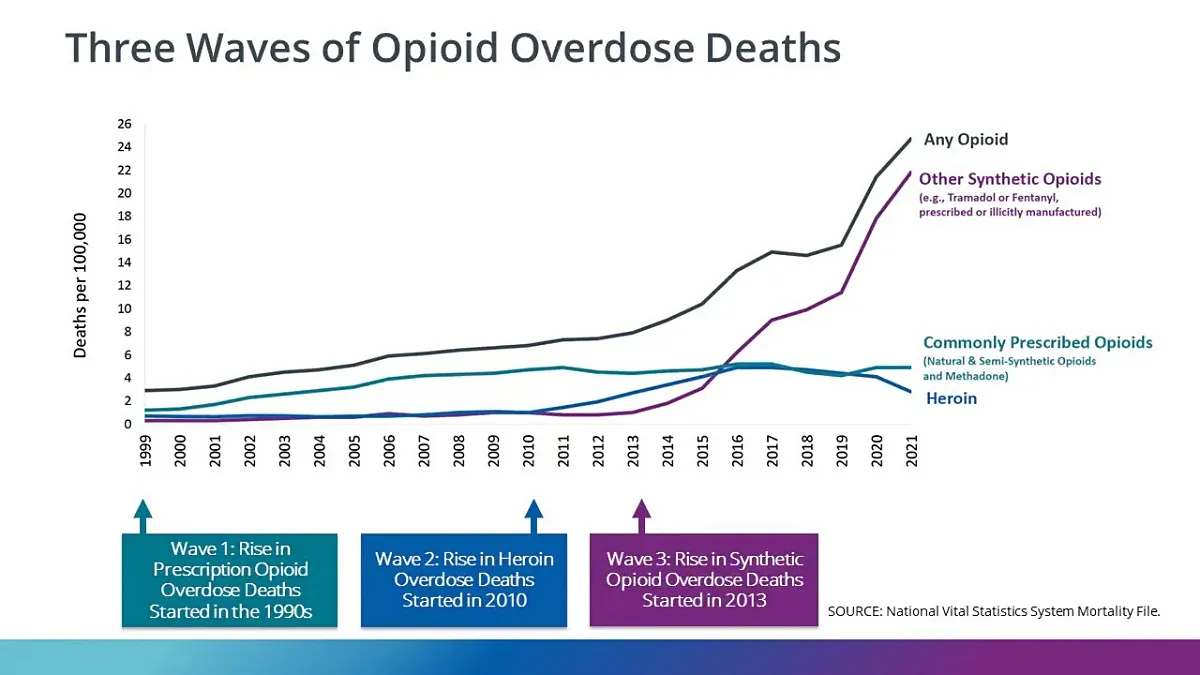US Secretary of State Anthony Blinken’s three-day visit to China concluded on Friday (April 26), after a meeting with Chinese President Xi Jinping. Apart from talks on Ukraine, Taiwan, and China’s “dangerous actions” in the South China Sea, Blinken also spoke about the production and export of “synthetic opioid precursors”, specifically the drug fentanyl, during the visit, the Associated Press reported.
In a video posted to X on April 24, Blinken said that he planned to “work on issues that matter to the American people. One of those is fentanyl synthetic opioids, the leading killer of Americans between the ages of 18 and 49.” In another post on Friday, he said the issue of counternarcotics was an area of “shared interest” discussed during his meeting with Chinese Foreign Affairs Minister Wang Yi.

Here is why fentanyl is a major problem for the United States — and China’s role in it.
What is the scale of the United States’ opioid epidemic?
Opioids are a class of drugs that “derive from, or mimic, natural substances found in the opium poppy plant”, according to the website of US-based Johns Hopkins Medicine. They produce a variety of effects, including pain relief and euphoria, and are highly addictive. Some common opioids include oxycodone, morphine, codeine, heroin, and fentanyl.
According to the US Drug Enforcement Administration (DEA), “Fentanyl is a potent synthetic opioid drug approved by the Food and Drug Administration for use as an analgesic [for pain relief] and anesthetic. It is approximately 100 times more potent than morphine and 50 times more potent than heroin as an analgesic.” But overdoses can cause “stupor, changes in pupil size, clammy skin, cyanosis [blue skin], coma, and respiratory failure leading to death”.
Users feel opioids’ impact immediately, and it wears off as quickly — making users need it regularly. Often, people who initially start using prescription opioid-based painkillers get addicted.
The US has been witnessing what many have called an “opioid epidemic”. According to the US Centers for Disease Control and Prevention, “the number of people who died from a drug overdose in 2021 was over six times the number in 1999… Over 75% of the nearly 107,000 drug overdose deaths in 2021 involved an opioid”.
Story continues below this ad
 Waves of opioid deaths in the US. (Via CDC website)
Waves of opioid deaths in the US. (Via CDC website)
What is China’s role in the opioid epidemic?
The US saw a spike in synthetic opioid-related deaths after 2013, largely due to the rapid proliferation of illicitly manufactured fentanyl, and fentanyl analogues like acetyl fentanyl and carfentanil. A US House Committee report from April 16 found that inexpensive fentanyl is increasingly cut into other drugs, often without the buyers’ knowledge.
The US has primarily blamed two countries for the trafficking of fentanyl — Mexico and China. A 2020 DEA intelligence report (‘Fentanyl Flow to the United States’), stated that fentanyl and fentanyl-related substances were trafficked from China through international mail and express consignment operations.
Investigative journalist Ben Westhoff told Vice News about how he found several Chinese companies in Wuhan and Shanghai being involved in the manufacturing of chemicals used to create synthetic opioids (precursors). China-manufactured chemicals would be shipped to Mexico for processing into pills and then sent to the US.
The previously mentioned House committee report stated that the Chinese Communist Party “directly subsidises” fentanyl production through tax rebates to companies — often engaged in other, legal chemical manufacturing — which are implicated in the production of precursors.
Story continues below this ad
On April 24, US President Joe Biden signed the FEND Off Fentanyl Bill into law to combat “illicit fentanyl traffickers in Mexico and the creators of precursor chemicals in China”.
Need for US-China cooperation
The US understands that dealing with the fentanyl crisis at home needs cooperation with China. Both governments have made occasional progress on the matter.
In 2019, China announced it would add fentanyl-related substances to a list of controlled narcotic drugs. According to the DEA, China’s move saw some of the production shifting to India, although here too export of fentanyl precursors has been regulated since 2018.
However, given the deterioration of the US-China relations following the Covid-19 pandemic, trade wars, and tensions over Taiwan and the South China Sea, cooperation on this front has been adversely impacted.
Story continues below this ad
Of late, there has been an attempt at resuming cooperation. In November 2023, following Xi’s meeting with Biden, a bilateral Counternarcotics Working Group was announced to coordinate law enforcement actions and address the misuse of precursor chemicals, among other things.
The many roadblocks to dealing with the fentanyl crisis
According to Westhoff, a lot also depends on China’s local governments. Many provinces see fentanyl production as a source of employment for people. To evade law enforcement agencies, operations often slightly tweak the formulae of certain chemicals.
China has also deflected blame onto the US, pointing to how even before fentanyl, the opioid crisis was in full swing. US pharmaceutical companies such as Purdue Pharma have been accused of handing out heavy-duty opioid prescriptions to patients, making them opioid addicts who seek ever more potent drugs.
And China is just a part of a much more complex puzzle, involving many countries, criminal organisations, and issues. For instance, Mexico is a major player in the trade, but cooperation with the country has been difficult to achieve. Earlier this year, the AP reported the head of Mexico’s detective agency as saying: “Mexico has been the champion of methamphetamine production, and now fentanyl.”
Story continues below this ad
With the US presidential elections due this year, fentanyl and opioid misuse is a major topic for voters. A Bloomberg News/Morning Consult poll from March found that 8 out of 10 voters in the seven swing states (states where Democrats and Republicans have similar levels of support ) said fentanyl misuse is a “very important” or “somewhat important” issue for them in voting. This was more than the number who cited abortion, climate change, labour and unions, or the wars in Ukraine and Gaza.



 Waves of opioid deaths in the US. (Via CDC website)
Waves of opioid deaths in the US. (Via CDC website)




































